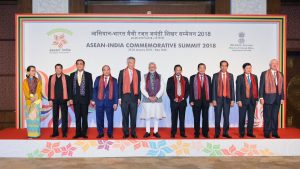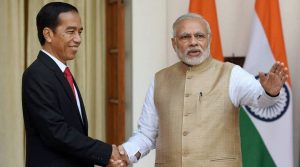 Underlining an upswing in India’s Act East policy amid competitive geopolitics in the region, Prime Minister Narendra Modi will engage with the leaders of three key ASEAN countries, including Indonesia, Malaysia and Singapore, this week.
Underlining an upswing in India’s Act East policy amid competitive geopolitics in the region, Prime Minister Narendra Modi will engage with the leaders of three key ASEAN countries, including Indonesia, Malaysia and Singapore, this week.
In fact, China’s shadow will loom large during PM Modi’s three-nation ASEAN voyage as he seeks the support of Jakarta, Kuala Lumpur and Singapore for shaping an inclusive East Asian regional architecture and Indo-Pacific regional order.
The visit of PM Modi to India’s key strategic partners in the region takes place barely four months after India hosted special commemorative summit with ASEAN in New Delhi and the leaders of all ASEAN countries participated as guests of honour at the Republic Day celebrations. This reflects the increasing salience of ASEAN and East Asia region in India’s geopolitical and foreign policy compass.
Enhancing maritime security cooperation will figure prominently in discussions in all the three capitals. With China hard-selling One Belt One Road (OBOR) project, India has intensified strategic engagement with ASEAN and other major global power centres to shape an alternative paradigm of connectivity. India has rejected OBOR on grounds that China-Pakistan Economic Corridor, a vital node of OBOR, passes through the Pakistan-controlled Kashmir, and hence violates India’s sovereignty.

In Jakarta, PM Modi’s talks with Indonesian President Joko Widodo are expected to culminate in an all-encompassing joint declaration that will place economic and strategic ties between India and Indonesia on a higher trajectory.
Ahead of the visit, Preeti Saran, Secretary (East) in India’s external affairs ministry, described Indonesia as India’s closest maritime neighbour and stressed on the possibility of discussions on strengthening maritime cooperation.
On May 31, Mr Modi will also make a brief stopover in Kuala Lumpur to meet the newly elected Malaysia’s Prime Minister Mahathir Mohammad and hold exploratory talks to upscale India-Malaysia relations under the new dispensation in Kuala Lumpur.
In Singapore, PM Modi will meet hold wide-ranging talks with Singaporean counterpart Lee Hsien Loong and review implementation of plans for expanding economic and development cooperation between the two countries. The showpiece of Modi’s Singapore visit will be his keynote address at the 17th Shangri-la Dialogue, the region’s marquee event on strategic-defence and foreign policy issues. In his address, Mr Modi is expected to outline India’s vision of a resurgent Asia and the imperative for enhanced regional coordination to maintain a rules-based regional and international order. In particular, Mr Modi is expected to unveil India’s oceanic vision of maritime security in the Indo-Pacific region, with special focus on promoting freedom of navigation in the backdrop of the ongoing churn in South China Sea. The region and the world, specially China, will be keenly listening in on the Indian prime minister’s speech.
Author Profile

- Manish Chand is Founder and Editor-in-Chief of India Writes Network (www.indiawrites.org) and India and World, a pioneering magazine focused on international affairs. He is CEO, Centre for Global India Insights, an India-based think tank focused on global affairs.
Latest entries
 India and the WorldFebruary 17, 2026South-by-South: Focus on people-centric solutions at India AI summit
India and the WorldFebruary 17, 2026South-by-South: Focus on people-centric solutions at India AI summit India and the WorldFebruary 7, 2026Modi hails interim India-US trade deal, Goyal says no concessions made on agriculture
India and the WorldFebruary 7, 2026Modi hails interim India-US trade deal, Goyal says no concessions made on agriculture India and the WorldFebruary 2, 2026Trump announces trade deal with India, Modi ‘delighted’
India and the WorldFebruary 2, 2026Trump announces trade deal with India, Modi ‘delighted’ India and the WorldJanuary 31, 2026Palestinian minister bats for mediatory role for India in ending Gaza conflict
India and the WorldJanuary 31, 2026Palestinian minister bats for mediatory role for India in ending Gaza conflict







